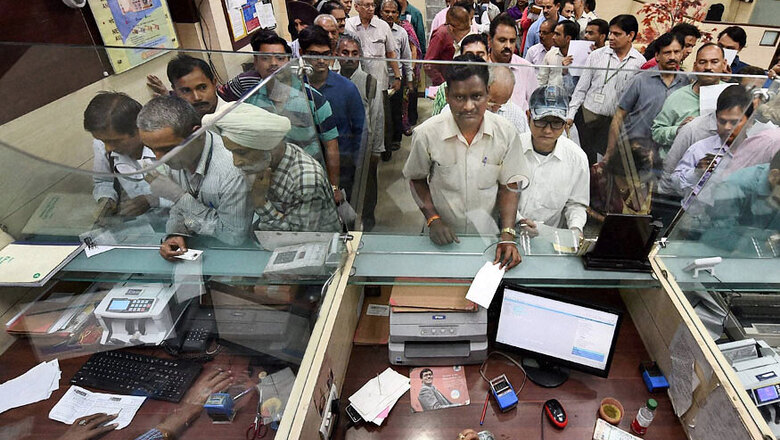
views
New Delhi: Earlier this month, Islamic seminary Darul Uloom Deoband issued a fatwa asking Muslims to avoid families that raise 'haram' (illegitimate) money earned from a banking job. Reason: Taking interest from loans is something that goes against the Sharia law and Islamic banking system.
However, the first thought that an average man has before borrowing money from a conventional bank is the interest rate that the bank would levy. And how does a bank function without charging any interest money on the borrowed amount, except for the minimal organizational charges?
Reserve Bank of India guidelines specifically state that banks are compulsorily required to charge an interest and pay taxes to the central government according to pre-decided rates set by the apex bank and the finance ministry.
However, the Muslim Fund Trust in Deoband headed by Haseeb Siddiqui is a financial institution that works on an interest-free loan module adapted as per the Quranic Shariah model.
Deoband is a small city tucked away in Uttar Pradesh’s Saharanpur district and known for its Islamic movement and the Darul Uloom Deoband.
The Darul Uloom, in its latest fatwa said, “Those who are nourished with 'haram' (illegitimate) wealth, are usually not good in respect to instinct and morals. Hence, it should be avoided. One should find out a match in some pious family."
Haseeb Siddiqui explains this ideology that he runs his trust on, “Interest is haram (illegitimate) in Islam. The Quran states that if you cannot provide a 100% assurance that a customer’s money is safe in your bank, charging an interest until then is wrong. Conventional banks levy upfront interests and say that your money is safe from everything, however, what if there is an earthquake or a sudden fire or flood? What will the banks do then? So, there is a chance that your money is unsafe even if due to unforeseen circumstances. This is where Islamic rules state that one shouldn’t be charging interest.”
One wonders how the institution functions, financially, if there is no interest charged.
To overcome the compulsory need for money, the trust has formulated mandatory rules for its potential consumers.
The trust offers loans to only those who have a savings deposit account with them.
“We need to have reserve some cash before we start lending. Therefore, we lend money only to those who have deposited money in our trust before. The entire procedure is very simple. You don’t need any identification proof and it takes only two hours. We have 76,000 accounts in our trust, with members coming from Deoband and its surroundings. 20 percent of these account holders are Hindus,” said Siddiqui.
Conventional banks demand security before issuing loans, which it has the option of falling back upon, in case the consumer defaults. The Muslim Fund Trust accepts only ornaments as security.
“We ask our customers to give us ornaments. There is a valuation officer who calculates the market value of the ornaments and informs us. We issue loans of the same amount to the customer with a time guarantee,” said Siddiqui while explaining how security deposits work at the trust.
While the entire procedure seems lucid, there is still a filling necessity for money to pay employees, run the office and take care of other expenses that conventional banks largely use the interest money for. The trust, however, has a different mechanism, much like the government stamp papers where clauses of an agreement are authorized, Deoband’s trust sell what they call forms as agreement papers.
“These forms cost 4 percent of the total loan amount that is disbursed. Say, a consumer takes a loan of Rs 10,000, provides the required ornaments of the exact market valuation and pays Rs 250 to get the agreement form. Proceeds from these forms are what go into the funds used to run the office and manage other ventures,” said Siddiqui.
Locals across social barriers, who avail the services of the Muslim Fund Trust, identify Siddiqui as a social worker who is vocal about the issues faced by Muslims. Popularly known as Abbaji, Siddiqui has been politically active as a member of BSP.
The trust, along with all its advantages, has inherent downsides too. No account holder can deposit more than Rs 2.5 lakh in his account as that will attract taxation and RBI regulations will come into play. As a response to this, Siddiqui said, “We deal with people who have extreme low income and meagre needs. None of them can produce Rs 2.5 lakh at one go.”
The trust neither has debit or credit cards, nor does it have netbanking facilities like other banks.
The whole controversy surrounding the Islamic banking system sparked off after the fatwa. While Haseeb Siddiqui supports the statement, the community stands divided in their opinion. Even the All India Muslim Personal Law Board (AIMPLB) has criticised the Darul Uloom Deoband for issuing the fatwa.
The fatwa was followed by protests by bank employees’ associations in Kolkata, who rejected the theory of interest being ‘haraam’.
According to the Islamic Supreme Council of America, a fatwa is an Islamic legal pronouncement, issued by an expert in religious law, pertaining to a specific issue, usually at the request of an individual or judge to resolve an issue where Islamic jurisprudence is unclear.
The Muslim Fund Trust also runs an eye-care hospital, driver-training centre and an orphanage from the proceeds after selling the agreement papers. Interestingly, these proceeds are deposited in a conventional bank.
“Yes, we deposit the money required to run our other ventures in a normal bank. Islam has forbidden the use of interest money for one’s own self. We spend this money for the organizations that we run and do not use it for our personal consumption.”



















Comments
0 comment